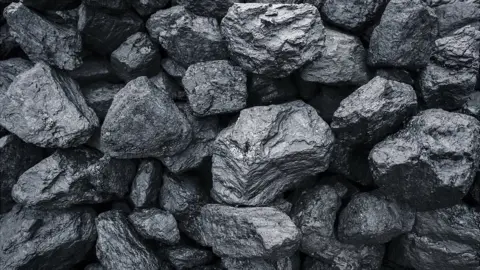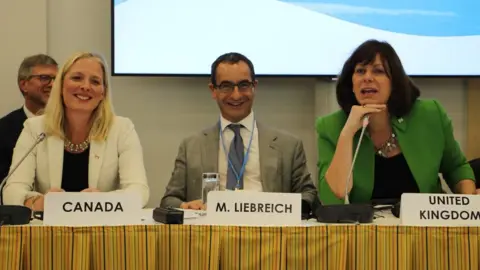UK and Canada lead global alliance against coal
 Getty Images
Getty ImagesThe UK and Canada have launched a global alliance of 20 countries committed to phasing out coal for energy production.
Members including France, Finland and Mexico, say they will end the use of coal before 2030.
Ministers hope to have 50 countries signed up by the time of the next major UN conference in Poland next year.
However some important coal consuming nations, including China, the US and Germany have not joined the group.
Reducing global coal use is a formidable challenge, as the fuel produces around 40% of the world's electricity at present.
As a highly carbon intensive source, coal contributes significantly to the rising levels of CO2 emissions that scientists reported earlier this week.
Researchers say that if the world is to curb dramatic temperature rises this century then coal use must be limited.
Called the Powering Past Coal Alliance, this new initiative sees countries, regions and provinces, signing up to setting coal phase-out targets and committing to no new investments in coal-fired electricity in their national jurisdictions or abroad.
No sacrifice
The UK has said it will end the generation of electricity from unabated coal by 2025. Unabated means that the coal is burnt without capturing the resulting carbon emissions.
Already, the move away from coal in the UK has been rapid. Around 40% of electricity was still being generated from coal in 2012 but in April this year the UK had its first full day without coal power in 135 years.
"We have not sacrificed growth," said Claire Perry, the UK's minister for climate change and industry.
"Since 1990 Britain has cut its emissions buy 42% and our economy has grown by 67%, that's the best performance in the G7 so this is not something that's a win-lose, it's a win-win situation."
 BEIS
BEISHowever many of those who have signed up to the alliance have little or no coal production or consumption, among them Fiji, Niue, and Costa Rica. Many of the richer countries involved have already announced their move away from coal and taken together the grouping only represents about 2.5% of global coal consumption.
There are also some significant coal consuming countries including Germany and China, absent from the list at present.
The anti-coal alliance are confident that by the time of the next major UN climate conference in Poland in 2018, there will be closer to 50 countries on board.
The development has been broadly welcomed by environmental groups.
"This is another positive signal of the global momentum away from coal, benefitting the health of the climate, the public and the economy," said Jens Mattias Clausen from Greenpeace.
"But it also puts on notice the governments who lag behind on ending coal or those who promote it that the world's dirtiest fossil fuel has no future."
Closest of allies
Those involved in the coal industry say the alliance needs to put more efforts into developing technology that will allow coal use to continue.
"With the world set to use fossil fuels, including coal, for the foreseeable future, Canada and the UK should direct efforts to advancing carbon capture and storage technology because that's much more likely to achieve global climate objectives than unrealistic calls to eliminate coal in major emerging economies," said Benjamin Sporton, chief executive of the World Coal Association.
With Canada and the UK leading the group, it means that two of the closest allies of the US are moving away from coal at a time when President Trump is talking about a revival for the fuel.
 BEIS
BEISThe White House has had a presence at this meeting with the President's special adviser on climate change, George David Banks telling reporters that coal and other fossil fuels were an important part of the solution to climate change.
Mr Banks believes that a so-called "clean coal alliance" involving the US, Japan and others would be something the Trump team would favour.
"I would say that the administration is interested in the idea," he told reporters.
"I'm guessing that would mean a clean coal alliance that would focus on highly efficient low emission coal plants and carbon capture utilisation and storage. I think there would be interest in exploring that."
Many environmental campaigners though, believe that attempts to produce clean coal are essentially efforts to prolong the dominance of the fossil fuel industry.
"People were worried that this summit would see Trump assaulting the Paris Agreement with his coal lobbyists," said Mohamed Adow from Christian Aid.
"But his actions have actually galvanised other nations into action, with a new alliance making it clear that coal's climate change threat must be taken seriously.
"The bottom line is coal is a dirty, unnecessary, polluting fuel that deserves to remain in a more ignorant and backward era. These countries are showing they understand that."
